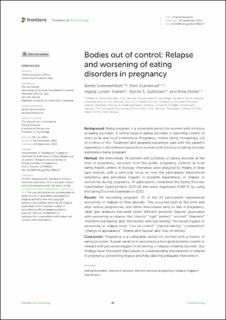| dc.contributor.author | Sommerfeldt, Bente | |
| dc.contributor.author | Skårderud, Finn | |
| dc.contributor.author | Kvalem, Ingela Lundin | |
| dc.contributor.author | Gulliksen, Kjersti Solhaug | |
| dc.contributor.author | Holte, Arne | |
| dc.coverage.spatial | Norway | en_US |
| dc.date.accessioned | 2022-10-03T12:41:11Z | |
| dc.date.available | 2022-10-03T12:41:11Z | |
| dc.date.created | 2022-09-28T12:00:34Z | |
| dc.date.issued | 2022-09-28 | |
| dc.identifier.issn | 1664-1078 | |
| dc.identifier.uri | https://hdl.handle.net/11250/3023377 | |
| dc.description.abstract | Background: Being pregnant is a vulnerable period for women with a history of eating disorders. A central issue in eating disorders is searching control of one’s body and food preferences. Pregnancy implies being increasingly out of control of this. Treatment and targeted prevention start with the patient’s experience. Little is known about how women with a history of eating disorder experience being pregnant. Method: We interviewed 24 women with a history of eating disorder at the time of pregnancy, recruited from five public pregnancy controls at local family health centers in Norway. Interviews were analyzed by means of ideal type analysis, with a particular focus on how the participants experienced pregnancy and perceived triggers in possible experiences of relapse or worsening during pregnancy. All participants completed the Eating Disorder Examination Questionnaire (EDE-Q) and were diagnosed (DSM-5) by using the Eating Disorder Examination (EDE). Results: On becoming pregnant, 23 of the 24 participants experienced worsening or relapse of their disorder. This occurred both at first time and after several pregnancies, and either interviewed early or late in pregnancy. Ideal type analyses indicated seven different personal features associated with worsening or relapse: the “chaotic” “rigid” “perfect” “worried” “shameful” “motherhood fearing” and “the mother with lost identity” Perceived triggers of worsening or relapse were: “loss of control” “unpredictability” “competition” “change of appearance” “shame and nausea” and “loss of identity.” Conclusion: Pregnancy is a vulnerable period for women with a history of eating disorders. A great variation in personal psychological dynamics seems to interact with perceived triggers in worsening or relapse of eating disorder. Our findings have important implications in understanding mechanisms of relapse in pregnancy, preventing relapse and help tailoring adequate intervention. | en_US |
| dc.description.abstract | Bodies out of control: Relapse and worsening of eating disorders in pregnancy | en_US |
| dc.language.iso | eng | en_US |
| dc.relation.uri | file://///kant/sv-psi-u1/ikvalem/pc/Downloads/fpsyg-13-986217.pdf | |
| dc.rights | Navngivelse 4.0 Internasjonal | * |
| dc.rights.uri | http://creativecommons.org/licenses/by/4.0/deed.no | * |
| dc.subject | eating disorders | en_US |
| dc.subject | anorexia nervosa | en_US |
| dc.subject | bulimia nervosa | en_US |
| dc.subject | pregnancy | en_US |
| dc.subject | relapse | en_US |
| dc.subject | triggers | en_US |
| dc.subject | risk factors | en_US |
| dc.title | Bodies out of control: Relapse and worsening of eating disorders in pregnancy | en_US |
| dc.title.alternative | Bodies out of control: Relapse and worsening of eating disorders in pregnancy | en_US |
| dc.type | Peer reviewed | en_US |
| dc.type | Journal article | en_US |
| dc.description.version | publishedVersion | en_US |
| dc.subject.nsi | VDP::Medisinske Fag: 700::Helsefag: 800::Samfunnsmedisin, sosialmedisin: 801 | en_US |
| dc.source.journal | Frontiers in Psychology | en_US |
| dc.identifier.doi | 10.3389/fpsyg.2022.986217 | |
| dc.identifier.cristin | 2056297 | |
| cristin.ispublished | true | |
| cristin.fulltext | original | |
| cristin.qualitycode | 1 | |

